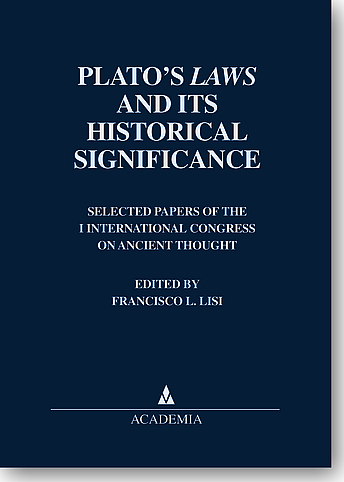Lisi
Plato's Laws and its historical significance
ISBN 978-3-89665-115-0
englischOf all of Plato's dialogues the Laws was the most related to the social and political circumstances of the time and was more influential as theoretical writing on the politics of every subsequent epoch than his other major work on the subject, the Republic. For modern democracy, some of the theoretical principles that were exposed for the first time in the Laws are fundamental: the rule of law, the check and balance of power, etc.
The understanding of the largest work written by Plato has substantially improved in the last decades thanks to increasing research.
This selection from the papers tries to offer a panoramic vision of the work, which is being done at present in the main fields by well known scholars like T. J. Saunders, L. Brisson, Kl. Schöpsdau, A. Neschke, Chr. Bobonich, Sl. Dusanic and others. The first set of contributions is related to the new notion of law which Plato shapes in the Laws and its connection to the dialogue as genre. The reader will also find a set of papers devoted to the relationship between virtue and state, the nature of the state, and the metaphysics. The section devoted to the specific organisation of the Magnesian State offers papers that investigate the Magnesian economy (in its modern sense), the nocturnal council, the laws about sexuality and the position of the slaves. The section devoted to the relationship of the Laws to its historical context contains contributions which try to explain the impact of the ideological and historical situation on the work and its possible influence on the political circumstances of the time. Two papers analyse the influences of the Laws on the Neoplatonic philosophy and in John Locke. Finally the textual tradition of the dialogue is considered.
englischOf all of Plato's dialogues the Laws was the most related to the social and political circumstances of the time and was more influential as theoretical writing on the politics of every subsequent epoch than his other major work on the subject, the Republic. For modern democracy, some of the theoretical principles that were exposed for the first time in the Laws are fundamental: the rule of law, the check and balance of power, etc.
The understanding of the largest work written by Plato has substantially improved in the last decades thanks to increasing research.
This selection from the papers tries to offer a panoramic vision of the work, which is being done at present in the main fields by well known scholars like T. J. Saunders, L. Brisson, Kl. Schöpsdau, A. Neschke, Chr. Bobonich, Sl. Dusanic and others. The first set of contributions is related to the new notion of law which Plato shapes in the Laws and its connection to the dialogue as genre. The reader will also find a set of papers devoted to the relationship between virtue and state, the nature of the state, and the metaphysics. The section devoted to the specific organisation of the Magnesian State offers papers that investigate the Magnesian economy (in its modern sense), the nocturnal council, the laws about sexuality and the position of the slaves. The section devoted to the relationship of the Laws to its historical context contains contributions which try to explain the impact of the ideological and historical situation on the work and its possible influence on the political circumstances of the time. Two papers analyse the influences of the Laws on the Neoplatonic philosophy and in John Locke. Finally the textual tradition of the dialogue is considered.


